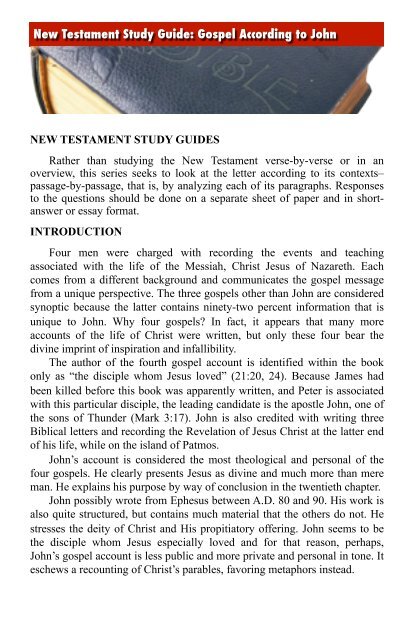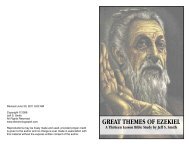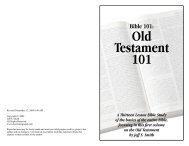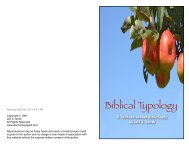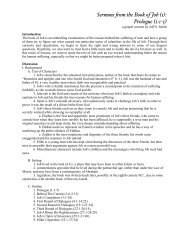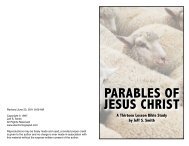New Testament Study Guides - ElectronicGospel
New Testament Study Guides - ElectronicGospel
New Testament Study Guides - ElectronicGospel
You also want an ePaper? Increase the reach of your titles
YUMPU automatically turns print PDFs into web optimized ePapers that Google loves.
<strong>New</strong> <strong>Testament</strong> <strong>Study</strong> Guide: Gospel According to John<br />
NEW TESTAMENT STUDY GUIDES<br />
Rather than studying the <strong>New</strong> <strong>Testament</strong> verse-by-verse or in an<br />
overview, this series seeks to look at the letter according to its contexts–<br />
passage-by-passage, that is, by analyzing each of its paragraphs. Responses<br />
to the questions should be done on a separate sheet of paper and in shortanswer<br />
or essay format.<br />
INTRODUCTION<br />
Four men were charged with recording the events and teaching<br />
associated with the life of the Messiah, Christ Jesus of Nazareth. Each<br />
comes from a different background and communicates the gospel message<br />
from a unique perspective. The three gospels other than John are considered<br />
synoptic because the latter contains ninety-two percent information that is<br />
unique to John. Why four gospels? In fact, it appears that many more<br />
accounts of the life of Christ were written, but only these four bear the<br />
divine imprint of inspiration and infallibility.<br />
The author of the fourth gospel account is identified within the book<br />
only as “the disciple whom Jesus loved” (21:20, 24). Because James had<br />
been killed before this book was apparently written, and Peter is associated<br />
with this particular disciple, the leading candidate is the apostle John, one of<br />
the sons of Thunder (Mark 3:17). John is also credited with writing three<br />
Biblical letters and recording the Revelation of Jesus Christ at the latter end<br />
of his life, while on the island of Patmos.<br />
John’s account is considered the most theological and personal of the<br />
four gospels. He clearly presents Jesus as divine and much more than mere<br />
man. He explains his purpose by way of conclusion in the twentieth chapter.<br />
John possibly wrote from Ephesus between A.D. 80 and 90. His work is<br />
also quite structured, but contains much material that the others do not. He<br />
stresses the deity of Christ and His propitiatory offering. John seems to be<br />
the disciple whom Jesus especially loved and for that reason, perhaps,<br />
John’s gospel account is less public and more private and personal in tone. It<br />
eschews a recounting of Christ’s parables, favoring metaphors instead.


